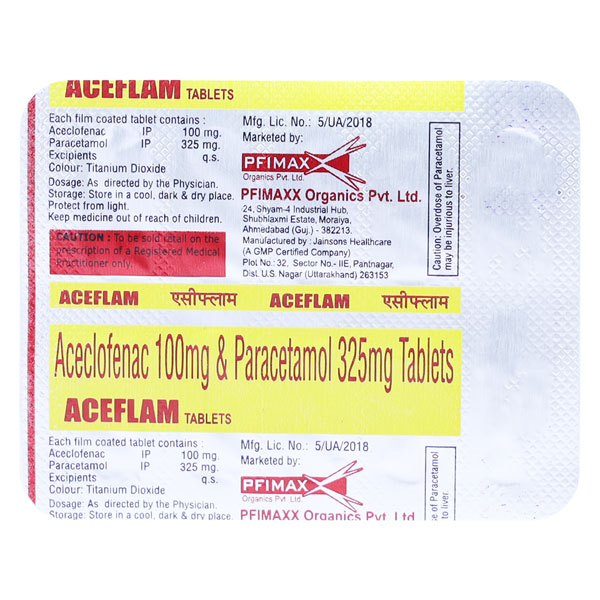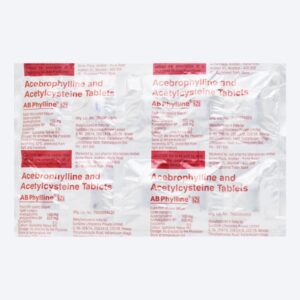1. Product Introduction:
- Name: Aceflam 100mg Tablet 10S
- Composition: Aceclofenac 100mg + Paracetamol 500mg
- Type: Combination medication with anti-inflammatory and analgesic properties.
- Form: Tablet
ACEFLAM 100MG TABLET should be taken with or without food. You should take it regularly as advised by your doctor. Your doctor may change the dose and time between doses according to your pain level and your needs. Do not take more or use it for a longer duration than recommended by your doctor.
Some of the common side effects of this medicine include nausea, vomiting, stomach pain, loss of appetite, heartburn, and diarrhea. If any of these side effects bother you or do not go away with time, you should let your doctor know. Your doctor may help you with ways to reduce or prevent these side effects by prescribing an alternative medicine or adjusting the dose.
ACEFLAM 100MG TABLET may not be suitable for everybody. Before taking it, let your doctor know if you have any problems with your heart, kidneys, liver, or have stomach ulcers. To make sure it is safe for you, let your doctor know about all the other medicines you are taking. Pregnant and breastfeeding mothers should first consult their doctors before using ACEFLAM 100MG TABLET.
2. Uses:
- Pain Relief: Aceflam is commonly used for the management of pain associated with conditions such as osteoarthritis, rheumatoid arthritis, and musculoskeletal disorders.
- Fever Reduction: Paracetamol, one of the components, is known for its antipyretic properties, aiding in reducing fever.
3. Benefits:
- Dual Action: Aceclofenac provides anti-inflammatory and analgesic effects, while Paracetamol contributes to pain relief and fever reduction.
- Comprehensive Pain Management: The combination allows for a more comprehensive approach to managing various types of pain and inflammatory conditions.
4. Side Effects:
- Common side effects may include:
- Gastrointestinal issues like nausea, indigestion, and abdominal pain.
- Drowsiness or dizziness.
- Headache.
- Skin rash or itching.
- Serious side effects are rare but may include:
- Gastrointestinal bleeding or ulcers.
- Allergic reactions such as skin rash, swelling, or difficulty breathing.
- Hepatotoxicity (liver damage).
- It is important to seek medical attention if any severe or persistent side effects occur.
5. Drug Interactions:
- The combination may interact with other medications. Inform your healthcare provider about all medications, supplements, or herbal products you are taking.
- Common interactions may occur with:
- Other NSAIDs.
- Anticoagulants (blood thinners).
- Certain medications affecting liver function.
- Always consult with your healthcare professional to ensure there are no contraindications or potential interactions based on your specific medical history or other medications.
Note: This information is a general overview and not a substitute for professional medical advice. Consult with your healthcare provider for personalized guidance based on your health condition and medical history.
SAFETY ADVICE

Alcohol

Pregnancy

Breast feeding

Driving

Kidney
Use of ACEFLAM 100MG TABLET is not recommended in patients with severe kidney disease.

Liver
However, the use of ACEFLAM 100MG TABLET is not recommended in patients with severe liver disease and active liver disease.
| Weight | 0.5 kg |
|---|---|
| Dimensions | 10 × 10 × 10 cm |



